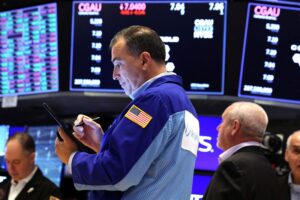The Diverging Landscape of Hedge Fund Returns: Discretionary vs. Systematic Strategies
In recent months, the performance of hedge funds has vividly illustrated the chasm between those adept at navigating unpredictable market conditions and those constrained by rigid algorithmic strategies. Hedge funds that thrive on discretion—the ability to seize opportunities as they arise—are currently reaping rewards, while systematic funds face significant setbacks.
Performance Breakdown
According to PivotalPath’s latest report, systematic hedge funds, which rely on algorithms to capitalize on market trends, have struggled to maintain profitability. As of May, these funds were down more than 11%. In fact, leading global systematic funds, such as Systematica, Transtrend, and Aspect Capital—managing close to $30 billion collectively—reported declines of around 18.5%, 16.3%, and 15%, respectively.
Contrastingly, discretionary hedge funds have shown resilience, posting gains of nearly 7% by the end of May. Such funds have navigated the turbulent waters of the market with relative success, largely by adjusting their strategies in response to rapid shifts in investor sentiment and geopolitical developments.
Gwyn Roberts, head of manager relations at PivotalPath, emphasized the challenges facing trend-following funds: “They have been whipsawed and haven’t been able to latch on to any consistent trend,” he noted. The recent volatility—spurred by events like tariff announcements—has made it increasingly challenging for these systematic strategies to capture sustained market movements.
The Market’s Rocky Path
The first half of the year has been tumultuous, with European stocks gaining approximately 10% by the end of February before plummeting by 20% in March. This sharp decline coincided with significant announcements from U.S. President Donald Trump, creating an environment where reactions were volatile and unpredictable. The most detrimental positions for trend funds this year have included U.S. Treasuries, various currencies, and even commodities like coffee.
Despite this, the gap in performance between discretionary and systematic hedge funds has begun to narrow as markets stabilized in April.
Macro Hedge Funds on the Rise
On a brighter note, discretionary macro hedge funds have achieved broadly positive returns in 2023. For instance, Rokos Capital Management, managing $22 billion in assets, reported returns of 9.5%, while EDL Capital outperformed with a remarkable 24% return. Even Brevan Howard saw gains with its Alpha Strategies fund, up 4.32%, although its flagship fund faced a slight dip of 2.12%.
Historically, macro traders have boasted average annual returns of about 8.5%, while managed futures traders, including trend funds, recorded 7.2% since 1998. Interestingly, discretionary macro traders have fared better, averaging 9.6% since 2001. As PivotalPath’s Roberts noted, "Managed futures tend to be used in investor portfolios as a defensive allocation, which performs well when other strategies struggle."
The Role of Multi-Strategy Funds
Many of the larger hedge fund firms incorporate both discretionary and systematic strategies to cushion against market volatility. For instance, Man Group’s systematic AHL Alpha Programme is down 10.6% for the year, while its multi-strategy fund is up around 5.4%. AQR Capital Management saw a commendable 10.6% return in its multi-strategy Apex fund, showcasing the potential benefits of diversification.
Graham Capital Management serves as another prime example, with its Multi-Alpha Opportunity fund posting an almost 9% return this year, effectively offsetting an 8.7% drop in its Tactical Trend fund. Ken Tropin, the firm’s founder, aptly stated that during periods of violent trend reversals, "it generally hasn’t paid to overreact and deviate from trading models that have historically performed well in a variety of market cycles."
Outlook Ahead
As markets navigate uncertain conditions, the dynamics between discretionary and systematic hedge funds will continue to unfold. Discretionary strategies appear to be the more adaptive choice in today’s environment, but investors should remain aware of the potential for resurgence in systematic strategies should market patterns stabilize.
For discerning investors looking to understand the nuances of hedge fund performance or seeking adaptive strategies in an unpredictable landscape, Extreme Investor Network offers cutting-edge insights and resources. Stay informed and navigate the complexities of finance with clarity and confidence.

